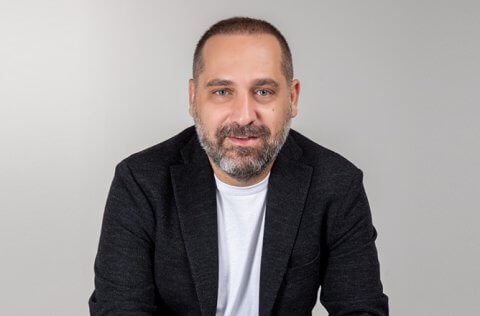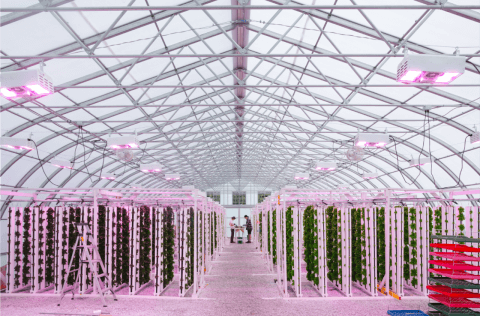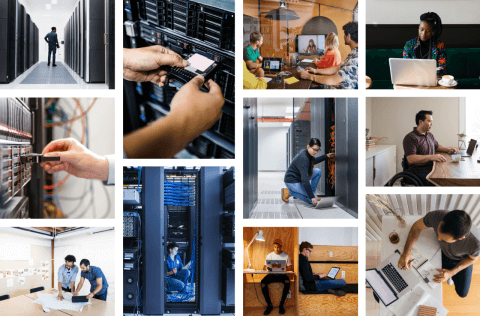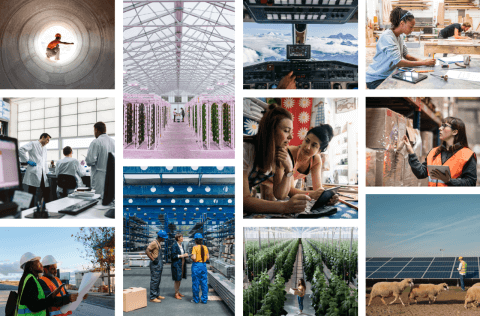CNME Editor Mark Forker secured an exclusive interview with Tarek Khalil, Director, Middle East & North Africa, Google Cloud, to find out how the tech giant has become the undoubted partner of choice for governments and businesses seeking transformation across the region, the challenges facing some enterprises – and how the culture of innovation that is fostered by Google allows it to produce innovative products and solutions. 
Tarek Khalil is one of the most respected and revered IT leaders in the Middle East.
Khalil has enjoyed a decorated career across the Middle East region, one that has seen him work with renowned technology and IT behemoths.
Tarek joined Google in 2012 and in the 11 years that have elapsed since then, Khalil has played a pivotal role in ensuring that Google Cloud has become the ‘cloud partner of choice’ for governments, entities and enterprises all over the region.
He has helped cultivate, shape, manage and nurture Google’s cloud journey during the last decade.
CNME were delighted to secure an interview with Khalil, which was conducted at Google’s Innovation Hub in Dubai Internet City.
Khalil began the conversation by providing context on the appetite for change that exists among nations all across the GCC.
“The region has historically been an oil-based economy. However, every government across the Middle East has been looking at ways in which it can leverage the power of technology to completely diversify its economy, and the most tangible example of that in recent years has been the economic transformation that Kingdom of Saudi Arabia (KSA) is currently pursuing. I think the palpable desire for change has been a key element in attracting the global hyper-scalers to the region, with of course Google Cloud being one of them,” said Khalil.
There has been a tsunami of transformation across the region, which we know was accelerated by the COVID-19 pandemic in March, 2020.
Google Cloud has been hugely productive in terms of signing key strategic alliances, partnerships and collaborations over the last few years.
“In 2019, Google Cloud signed a strategic alliance with the Qatar Free Zone Authority in Doha, and then in 2020, we announced a significant partnership with Aramco in Saudi Arabia, and just last year, we entered into a new partnership with the government of Kuwait. It is important to understand that Google is a cloud native entity, we were born in the cloud. When we say we were born in the cloud, essentially, what that means is we know every single aspect of the cloud elements, and the success factors needed to help it scale in a very secure and trusted manner. Trust and security are key topics in the current climate, especially for data-driven companies. We have also contributed massively to the open-source community globally over the last number of years,” said Khalil.
Google Cloud is one of the most trusted names in the world, but to earn that trust it takes time, and as Khalil pointed out, they demonstrated their capabilities with their diverse range of first-class products and solutions. 
“As I aforementioned above, the fact we were born in the cloud enabled us to showcase our capability to scale to billions of users and consumers for products like Google Maps, Google Photos and Gmail. By being able to deliver those products and services in a very secure manner, resulted in us building great trust. That trust provided us with the springboard, or platform to then support the vision and strategies being set out by governments across the Middle East region, as part of their efforts to branch out from an oil-based economy, to our new digital economy. It became evident very early on, that Google Cloud was the partner of choice for their digital transformation journey,” said Khalil.
When asked what were the differentiating factors that positioned Google Cloud as the partner of choice for cloud transformation, Khalil touched on a number of points, including the autonomy of its ‘open cloud’ offering.
“Our open cloud gives customers the choice and autonomy to deploy workloads wherever they want. For example, if a customer has already started their journey, we are not asking them to reshuffle their whole strategy to Google Cloud, instead we can meet the customer at any point they want, whether that’s on-prem, or on another hyper-scaler provider. We have to fulfil this requirement, and our engineering team has created certain products that allow us to achieve this,” said Khalil.
Khalil also highlighted the impact the innovation cloud was having on the marketplace – and said the ‘culture’ the company fosters in terms of its approach to innovation allowed the tech giant to launch a staggering 2000 products and new features in 2022.
“It’s not just about the technology itself, it’s about how we engage with our customers and users by leveraging the right expertise in specific industries. We have not only utilised the power of Google Cloud, but also of Alphabet as a whole. By leveraging all this knowledge, we were able to launch 2000 products and features last year. We are very agile, and we evolve quickly, and the innovative and cultural approach that we adopt has enabled us to roll out these products and features in such large volume. In addition to this, we are also the cleanest cloud globally, and sustainability is in our DNA. You have to be totally aligned with every government, entity and enterprise’s agenda, whether it’s in relation to security, flexibility, scalability, clean cloud, or moving at speed. We have fulfilled these requirements, and that is why ultimately we are the partner of choice for nations across the Middle East region,” said Khalil.
Khalil also added that when entering into a new region, it’s imperative that you address the niche and specific concerns of each nation.
“We have a dedicated team that addresses key concerns for individual nations. If you look at our expansions globally, we address the infrastructure, the business opportunity – and the rules and
regulations in every country. That’s how we operate, and this is the criteria that we follow and pursue when we invest in any region,” said Khalil.
It has been well documented that many enterprises across the region have toiled with the demands of cloud transformation, but as Khalil pointed out, it’s critical that you have a robust plan for success and the right people to execute the project.
“It is fair to say that a large number of entities across the Middle East struggle with the demands of cloud transformation, but it’s important to counter that with the fact that there has been a large swathe of successful transformation projects. Technology is a great enabler, but to really tap into the benefits provided by disruptive technology then you have to devise a blueprint and a plan, and it needs to be driven by the right people. I also think an issue has been the scarcity of cloud technology expertise in the Middle East region. Cloud transformation is not only about lifting and shifting, it’s about redefining the organisation from the top down,” said Khalil. 
Khalil added that in every country that Google Cloud invests in they always look at capacity building, and claim it is at the very top of their agenda. He cited that a lack of skills and a shortage in talent remains a huge challenge for businesses, not only across the Middle East, but globally.
“We have invested in a centre of excellence in Doha, and last November, we announced another centre of excellence in Saudi Arabia. We are fully committed to upskilling, in an effort to ensure that every country has the required skillsets needed to drive these transformation programs. In Doha, we have trained more than 4,000 participants on our platform and this will continue throughout 2023,” said Khalil.
Another huge issue according to Khalil, was the misalignment that exists between the business and IT organisations within many entities, and budgetary constraints.
“We know a major problem for many businesses is a struggle for adequate budgetary resources. Many entities continue to struggle on that front because they continue to look at their IT departments as a cost centre. However, in reality if you look at those cost centres they are the closest to the technology, which means they can directly map innovation to be driven by technology. However, the misalignment between the business orgs and the IT orgs is creating this gap, posing a huge problem,” said Khalil.
Sustainability has now become a key priority for businesses globally, and with COP28 being held in Dubai in November, conversations around sustainability have been ramped up a few notches.
However, Khalil stressed that whilst sustainability is now very much in vogue across the IT industry, as entities attempt to reduce their carbon footprint, for Google Cloud it has always been embedded in their DNA.
“I believe that sustainability has become the top priority across the Middle East region for CEOs, and we see that surfacing. Over the last few years, we’ve seen new roles being created within organisations in an effort to drive sustainability initiatives and programs. Sustainability has been in our DNA since our inception as a company. In 2007, we were 100% carbon neutral, fast forward ten years to 2017, and we committed ourselves to run on carbon – free electricity by 2030, which means the way in which we power up our facilities and campuses is going to be matched with clean energy,” said Khalil.
Khalil also outlined how the Google Cloud platform is helping customers contribute to the environment.
“In 2020, we set out on our mission to run on 24/7 carbon-free electricity (CFE) by 2030, and as of 2021, we’ve achieved 66% of that goal. In addition to this, we are also aiming to achieve net-zero emissions across all of our operations and value chain by 2030. We are also empowering our customers to be more sustainable, by moving to our cloud platform customers are acutely aware that they are contributing positively to reducing carbon emissions,” said Khalil.
AI is the future, but there have been some that have voiced grave concerns over the evolution of the technology – and have called for greater control and regulations to be implemented before the genie is out of the bottle.
According to Khalil, Google Cloud is an ‘AI-first’ company.
“We are now in an era where AI has evolved from being the purview of academic research to being a practice. AI underpins the technological advancements that we have made in the new on-demand economy we live in, but AI has also been in Google’s DNA from the beginning. We are an AI-first company, and AI fundamentally sits at the heart of our company. In the current climate, it’s almost impossible for you to find a product that doesn’t have a built-in AI feature within the Google Cloud product portfolio. We look at AI both responsibly and boldly – and our focus is to extend our AI products to our consumers within our AI principles,” said Khalil. 
Security is a complex and constantly evolving threat, but again, Google is top of the leader-board when it comes to cloud security.
“Google was built with security in mind. We didn’t build a solution and then afterwards attempt to ringfence it with security, the security was always embedded in the product or solution. That approach is the reason we have never suffered a major security breach in the last 20 years and the recent DDos episode is evidence to that. Our security is built on zero trust.”
Khalil concluded a wonderful conversation, by highlighting the three key pillars that guide their Google Cloud security portfolio, and he also pointed to their acquisition of the global cybersecurity and incident response company Mandiant as being a gamechanger for their security offering.
“We have three key pillars. Firstly, Google Cloud is a completely trusted platform, the way we have built our platform is based on a very secure manner, where control sits in the hands of the customer too. Secondly, the zero-trust approach is critical, zero-trust means zero-trust even between the different layers. Finally, operational simplicity is very important. You want to offload your security teams from managing patches to logs by providing them with the right tools.
Our acquisition of Mandiant has been a huge addition for us, they have a strong foothold in terms of working with government entities, and the combination of their threat intelligence and incident response capabilities and our Google Cloud security portfolio allows us to deliver to our customers with a completely trusted environment, where they have nothing to worry about,” said Khalil.





